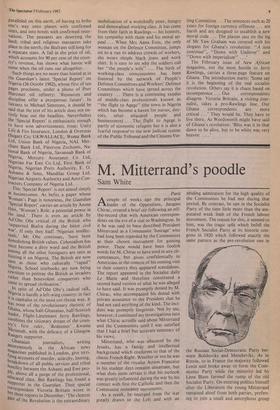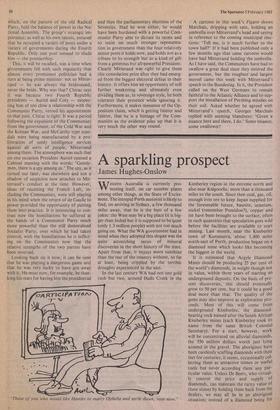M. Mitterrand's poodle
Sam White
Paris Acouple of weeks ago the principal leader of the Opposition, Jacques Chirac, created a brief stir following an off- the-record chat with American correspon- dents on the eve of a visit to Washington. In it he was said to have described President Mitterrand as a Communist 'hostage' who had long been regarded by the Communists as their chosen instrument for gaining power. These would have been foolish words for M. Chirac to have used in any cir- cumstances, but given confidentially to Americans in the context of his coming visit to their country they appeared scandalous. The report appeared in the Socialist daily Le Matin and therefore constituted a second-hand version of what he was alleged to have said. It was promptly denied by M. Chirac, who accompanied his denial with private assurance to the President that he had not said anything of the kind. The inci- dent was promptly forgotten. Not by me, however; I continued my investigations into what Chirac actually said about Mitterrand and the Communists until I was satisfied that I had a brief but accurate summary of his views.
Mitterrand, who was educated by the Jesuits, has a family and intellectual background which conforms to that of the classic French Right. Whether or not he was a member of the royalist Action Francaise in his student days remains uncertain, but what does seem certain is that his outlook was greatly influenced during the war by his contact with first the Catholic and then the Communist resistance movements.
As a result, he emerged from the war greatly drawn to the Left and with an abiding admiration for the high quality of the Communists he had met during that period. By contrast, he saw in the Socialist Party of the time little more than the am- putated weak limb of the French labour movement. The reason for this, it seemed to him, was the tragic split which befell the French Socialist Party at its historic con- gress in 1920 which followed exactly the same pattern as the pre-revolution one in the Russian Social-Democratic Party bet- ween Bolsheviks and Mensheviks. As in Russia, so in France the majority followed Lenin and broke away to form the Com- munist Party while the minority led by Leon Blum formed the rump of the old Socialist Party. On entering politics himself after the Liberation the young Mitterrand remained aloof from both parties, preferr- ing to join a small and amorphous group
which, on the pattern of the old Radical Party, held the balance of 'power in the Na- tional Assembly. The group's strategic im- portance, as well as his own talents, ensured that he occupied a variety of posts under a variety of governments during the Fourth Republic. Only one post seemed to elude him — the premiership.
This, it will be recalled, was a time when governments fell with such regularity that almost every prominent politician had a turn at being prime minister: not so Mitter- rand — he was always the bridesmaid, never the bride. Why was that? Chirac says it was because two Fourth Republic presidents — Auriol and Coty — suspec- ting him of too close a relationship with the Communist Party, vetoed his appointment to that post. Chirac is right. It was a period following the expulsion of the Communists from the government, of the Cold War and the Korean War, and McCarthy type scan- dals were being manufactured by a pro- liferation of seedy intelligence services against all sorts of people, Mitterrand among them. The atmosphere was such that on one occasion President Auriol opened a Cabinet meeting with the words: 'Gentle- men, there is a spy among us.' The spy, as it turned out later, was elsewhere and not a shadow of suspicion now attaches to Mit- terrand's conduct at the time. However, ideas of reuniting the French Left, in- cluding the Communists, were still playing in his mind when the return of de Gaulle to power provided the oppOrtunity of putting them into practice. It is interesting to con- trast now the humiliations he suffered at the hands of a Communist Party much more powerful than the still demoralised Socialist Party, over which he had taken control, with the humiliations he is inflict- ing on the Communists now that the relative strengths of the two parties have been reversed.
Looking back on it now, it can be seen that he was playing a dangerous game and that he was very lucky to have got away with it. He must now, for example, be than- king his stars for having lost the presidential and then the parliamentary elections of the Seventies. Had he won either, he would have been burdened with a powerful Com- munist Party able to dictate its terms and to insist on much stronger representa- tion in government than the four relatively minor posts it holds now, and holds not as a tribute to its strength but as a kind of gift from a generous but all-powerful President. Clearly Mitterand was right to give them this consolation prize after they had emerg- ed from the biggest electoral defeat in their history. It offers him an opportunity of still further weakening and ultimately even dividing them as, in sovereign style, he both tolerates their presence while ignoring it. Furthermore, it makes nonsense of the Op- position claim, which is getting fainter and fainter, that he is a hostage of the Com- munists as the evidence piles up that it is very much the other way round.
A cartoon in this week's Figaro shows Marchais, dripping with rain, holding an umbrella over Mitterrand's head and saying in reference to the coming municipal elec- tions: 'Tell me, is it much further to the town hall?' If it had been published only a few months ago that same cartoon would have had Mitterrand holding the umbrella. As I have said, the Communists have had to swallow a great deal since they entered the government, but the toughest and largest morsel came this week with Mitterrand's speech to the Bundestag. In it, the President called on the West Germans to remain faithful to the Atlantic Alliance and to sup- port the installation of Pershing missiles on their soil. Asked whether he agreed with Mitterrand's speech, Georges Marchais replied with seeming blandness: 'Given a nuance here and there, I do.' Some nuance, some swallower!















 Previous page
Previous page